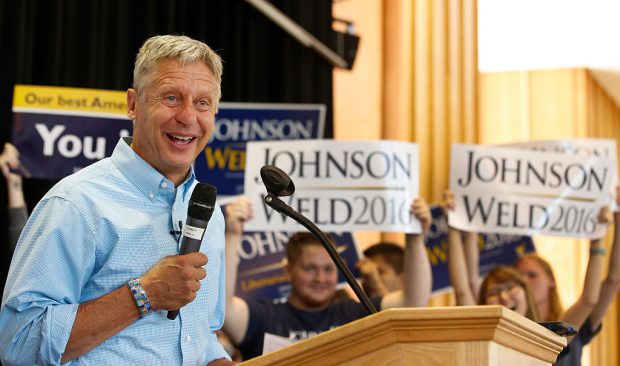Not long ago, America’s Libertarians—that’s capital-L, the pros—were ecstatic. Never before had their party nominated such a heavy-hitting presidential ticket. They boasted two former Governors, both credible (but not too credible) ex-Republicans, matching up against Donald Trump and Hillary Clinton, the two least popular major-party nominees in history.
Governor Johnson seemed to be living proof that the GOP was sinking fast and the Libertarians offered the viable alternative. For Libertarian lifers who had suffered indignities like the abortive presidential run of Bob Barr (another ex-Republican), Johnson/Weld represented an unprecedented opportunity for unprecedented relevance.
Instead, Libertarians have met with a familiar frustration. Despite the manifest weaknesses of Clinton and Trump, far too few Americans have found it in them to jump ship and sign on with Johnson and Weld. On the left, the Green party’s Jill Stein has persisted as a magnet for the sort of ingrates and idealists who are often most willing to experiment with their vote. On the right, Republicans rejecting Trump have had powerful incentives to skip right over the Libertarians. Only Clinton is a reliable firewall to keep the Orange One out of office. And only independent candidate Evan McMullin, yet another longtime Republican, offers conservatives an ideological home away from home.
At the same time, Libertarians have actually garnered more attention and support than ever. It’s just that they’re losing the expectations game. Gary Johnson’s highly-publicised media gaffes—he didn’t recognise the word Aleppo, he wouldn’t name Kim Jong-Un, he couldn’t think of a world leader he respected—hit them where it hurt, in the credibility. Rumours of Weld fleeing the ticket blunted their messaging further. Although these troubles haven’t done much to lower the Libertarian floor, they haven’t raised the ceiling. And the harsh reality seems to be that most voters feel, if they have to chose a clueless candidates, they may as well stick with the two major parties.
So what’s a Libertarian to do? The answer may well be waiting over the horizon of Inauguration Day. The likeliest outcome of the 2016 election is a sweeping Clinton victory, albeit one powered by exceptionally shallow support. With Republicans in disarray and Democrats out of sync with the populist times, Libertarians will have an opportunity that the major parties won’t. The expectations game will swing in their favour, and they’ll be able to build on their successes instead of starting from scratch. Republicans will feel safer switching parties once Trump isn’t looming over the White House. So will Democrats, for the same reason, who don’t love establishment corporatism or progressive identity politics. This year’s ‘libertarian moment’ may not have lived up to the hype. But there’s little reason to doubt that, next year, Libertarians’ momentum will only continue.







Comments